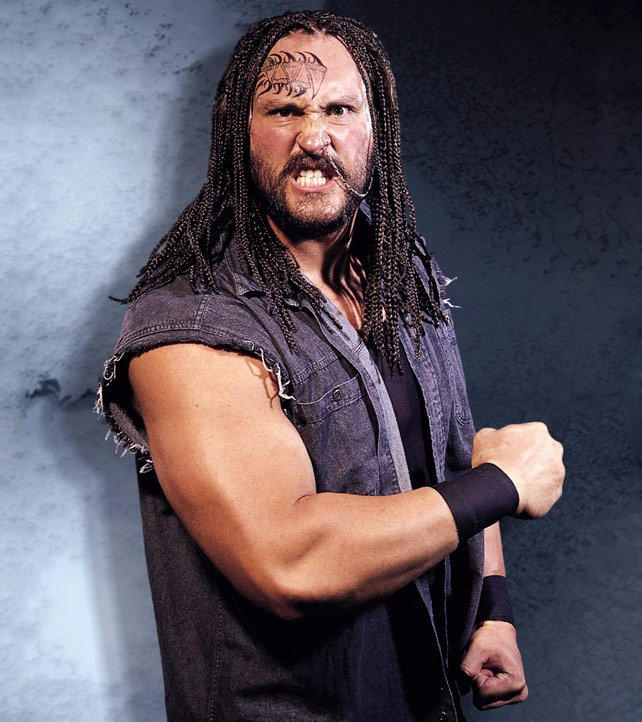With all the WWF talent jumping ship to WCW in 1996, Vince McMahon and VP of Talent Relations Jim Ross had to dig deep to find wrestlers to fill the void. There were the more conventional sources, such as WCW itself, ECW, and USWA…

…and then there was that great untapped talent pool known as the Big House. Yes, this week’s inductee was such a bad apple that he was fresh out of the slammer when he signed on the dotted line with Titan Sports.
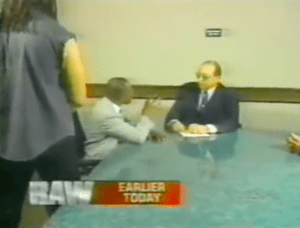
To build intrigue among RAW viewers, the WWF aired a series of segments where resident sports-entertainment attorney Clarence Mason negotiated with a skeptical Gorilla Monsoon to allow his client, an unnamed former Federation superstar, back into the squared circle.
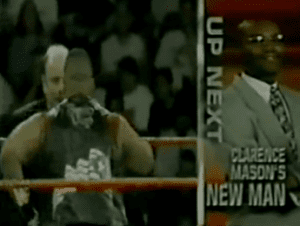
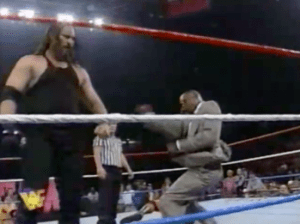
That mystery man turned out to be Crush.
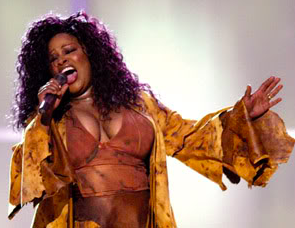
But gone was the fun-loving, mulleted “Chaka Bra” (a nickname he may have adopted out of fondness for Chaka Khan’s cleavage)…
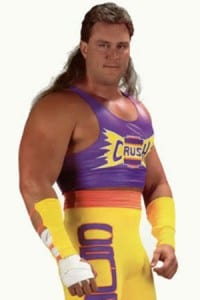
…who wore bright colors and said “brudda” every other sentence.
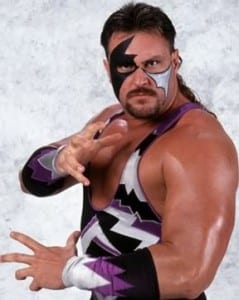
Even gone was the fearsome mulleted heel Crush who wore face paint and said “brudda” every third sentence.
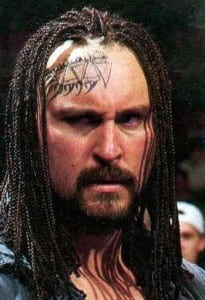
Instead of his famed flowing mane, Crush now wore dreadlocks.
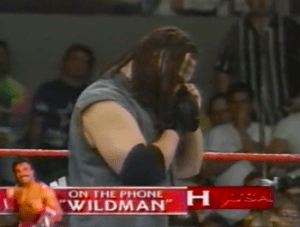
Instead of neon spandex, he now wore street clothes.

Instead of face paint, he now sported a (temporary) facial tattoo.
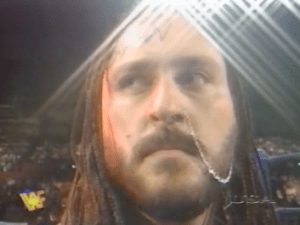
And instead of no really stupid piercings, he now hung a chain from his earring to his nose ring. He must have really liked Janet Jackson’s “Runaway” video.
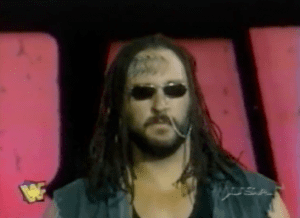
The point of this makeover, of course, was to show that Crush was a changed man, a bad dude whose outlook on life turned upside down while serving hard time.

I know Hawaiian lock-ups can’t be as luxurious as I imagine — deep down, I know they don’t really serve cocktails out of coconuts in the cafeteria or host surfing contests in the prison yard — but I still can’t fathom how they could have turned Chaka Bra into the hardened criminal who arrived back in the Federation in the summer of 1996.
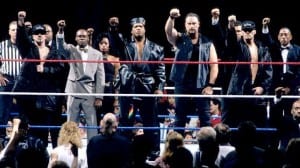
Plus, you wouldn’t think a guy like Crush — six foot eight, 315 pounds, muscular — would have had any trouble in prison. You don’t think Mike Tyson had to put in any extra effort to intimidate his fellow inmates, do you?
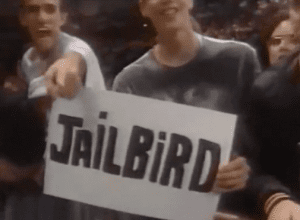
But the fact is that, for whatever reason, Crush was permanently and radically scarred by his stint in state custody. So scarred was he that he lost his mind when the fans called him “jailbird.”
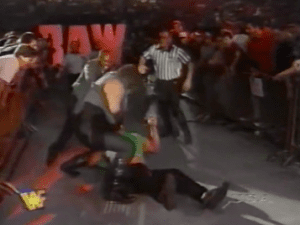
He even pulled a security guard over the guardrail and roughed him up because of the small chant.
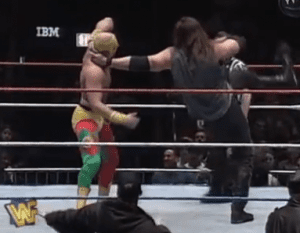
Crush didn’t care for society’s “rules,” which is why he adopted the heart punch as his signature move and didn’t care that by 1996 it was already decades out of date for a finisher.
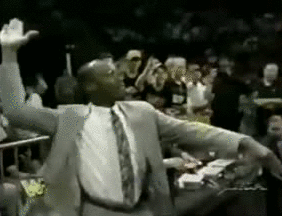
The WWF fans were seeing a cruel, cruel man who, high-fives notwithstanding, bore no connection to the Original Hawaiian Punch, Crush.
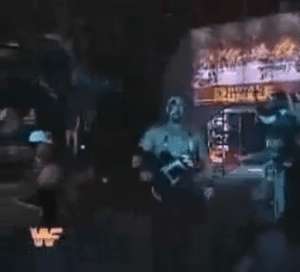
You’d think it would take years and years in a penitentiary to warp a man’s psyche and turn him into a hardened criminal, yet between Crush’s last federation appearance at the 1995 Royal Rumble and his re-appearance in 1996, a mere 18 months had passed.
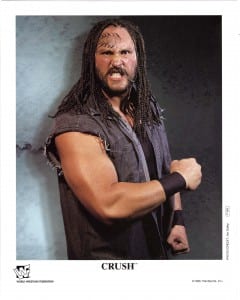
Now guess how long the WWF claimed Crush had been behind bars. Go on, guess.
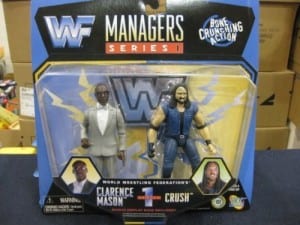
I can wait. While you formulate your guess, enjoy this photo of a Crush-Clarence Mason two-pack, no doubt marketed at the Crush superfan…

…by which I mean this kid from 1993.
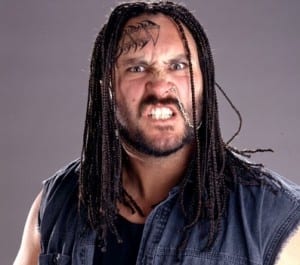
Anyway, your guess for how long the WWF claimed Crush had spent behind bars is way off. The correct answer:
one day

Yes, during Crush’s introductory segments, the WWF quietly acknowledged that he had only spent one day in jail — jail, not prison — and was never convicted of anything.
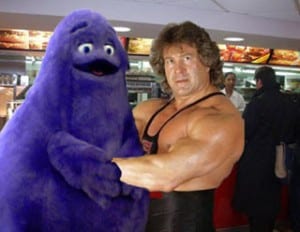
Even Olympic hero Ken Patera got two years for chucking a rock through a McDonald’s window, and he had mitigating circumstances in his favor.
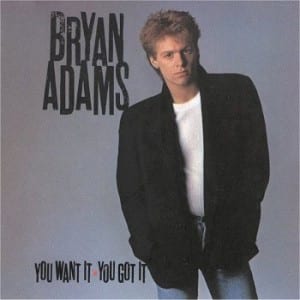
But Brian Adams — both in real life (for possession of steroids and an illegal firearm) and in storyline — only spent a single day in the slammer. His 24 hours in the clink put Brian Adams, the wrestler, on about equal footing in terms of street credibility as Bryan Adams, the soft-rock singer.
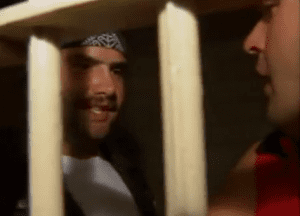
The Mountie spent a night in a New York prison, and he didn’t end up with any permanent mental scars. And he got raped!
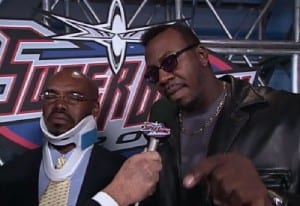
The WWF clearly didn’t have a problem employing guys with arrest records (the lead announcers at the time were Vince McMahon and Jerry Lawler, after all), so why did it take wrestling’s shrewdest Johnny Cochran stand-in weeks just to convince Gorilla Monsoon to sign Crush? Clarence Mason trademarked the second-most common letter in the English language, for Pete’s sake!

And there were more questions yet unanswered. Like, when exactly did Crush have time to get that prison tattoo — and it must have been a prison tattoo, as no reputable tattoo artist would have inked the eyesore on Adams’s face.
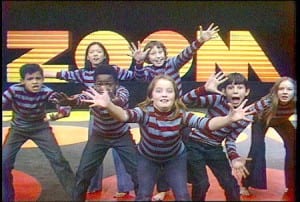
The mystery of Jailbird Crush continued. Nothing else about Crush’s subsequent WWF career made much more sense. Under legal representative Clarence Mason’s guidance, Crush joined the Nation of Domination, where he remained for half a year before Faarooq realized that his black separatist faction needn’t be as racially inclusive as, say, the cast of ZOOM.
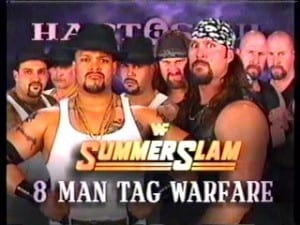
From there, Crush went one step further with his prison mindset; forget dumb piercings and disappearing face tattoos – Crush formed a gang of big, violent white guys who beat up rival black and Puerto Rican gangs. At least they didn’t call themselves the Aryan Bruddahood.
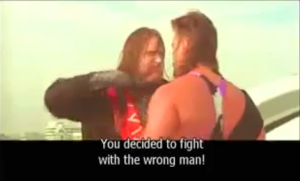
Frankly, the most surprising development of all for Crush was his teaming up with Brian Lee, who just a year earlier, as the Fake Undertaker, had beaten Kona Crush to death in a public showdown and had his body dumped into Lake Ontario.
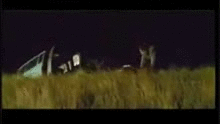
Come to think of it, that kind of ordeal would make anyone cranky and on edge, jailbird or not.

Mystery solved.

